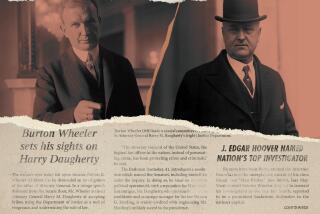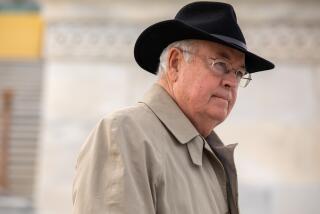Hubbell’s Guilty Plea Gives Ambiguous Close to Starr’s Arkansas Investigation
- Share via
WASHINGTON — After five years of dueling, the tortured legal battle between independent counsel Kenneth W. Starr and former Justice Department official Webster L. Hubbell ended this week in a draw that left both men bloodied but claiming victory.
Hubbell’s plea bargain did more than just keep President Clinton’s old golfing friend out of prison. It also marked the end of Starr’s quest to prove wrongdoing by the president and First Lady Hillary Rodham Clinton in connection with a maze of Arkansas business dealings in the 1980s--dealings to which Hubbell was often a central witness.
And in many ways, the anticlimactic deal typified the roadblocks and blind alleys that Starr ran into along the way of his five-year investigation, leaving the journey strangely inconclusive.
To Hubbell’s opponents, the burly former football player embodied the imposing, and well-financed, obstacles that confronted Starr. To Hubbell’s supporters, he was a victim of Starr’s zealotry, ruined by three separate indictments. And to those on both sides, the multiple convictions of a man whom Clinton called “my best friend”--and installed in the third-highest post at the Justice Department--demonstrated just how close the investigation ultimately came to the White House.
“He was really a tragic figure, rising to such prominence and then falling from grace,” said Mark Tuohey, a former deputy to Starr. “He became a very visible symbol of the confrontation between the independent counsel and the White House.”
Starr’s Final Report Still Due
Starr still must issue a final report to Congress on his findings, and that is probably months away. But the post-mortems have already begun on his five-year-long investigation and what some think went wrong with it.
“One of the difficulties Starr faced,” said Robert J. Giuffra, former counsel for the Senate Whitewater Committee, “was getting potential witnesses to tell the full truth. . . . As a result, information dribbled out over time and often was not available early enough in the investigation to give prosecutors something to build on.”
And no one symbolized that better than Hubbell. Starr pulled out all the stops--interrogation, grand jury subpoenas, indictments not only of Hubbell but also of his wife, prison time and the prospect of more of it--in a years-long effort to obtain information he was convinced Hubbell was covering up. But Hubbell insisted to the end that he knew of no wrongdoing by the Clintons.
The independent counsel’s lawyers “can indict my dog, they can indict my cat, but I’m not going to lie about the president,” Hubbell said at one point.
Even in this week’s case-closing plea bargain, the two sides clashed over just what Hubbell actually had admitted. By Starr’s account, Hubbell pleaded guilty to covering up legal work that he and Mrs. Clinton did for a bogus land deal in Arkansas. But an emotional Hubbell and his lawyers insisted that the plea dealt exclusively with an unrelated savings-and-loan lawsuit and “had nothing to do with Mrs. Clinton.”
The original Whitewater allegations--that the Clintons benefited from money funneled to the Whitewater land project from the failed Madison Guaranty Savings & Loan--first germinated in the Arkansas media in the 1980s. The issue resurfaced in the New York Times during Clinton’s 1992 campaign, but it was not until late 1993 that the allegations began to mushroom--to the point that the Clinton administration, under political pressure, agreed to have a special counsel appointed to clear the air. It was a decision many in the administration would regret.
By that time Hubbell, a former judge and Little Rock, Ark., mayor, had become associate attorney general and a key Clinton ally in the Justice Department. But as rumors swelled about his illicit billing practices in Little Rock, Hubbell was forced to resign his post in April 1994, and the matter, like others with only a tangential link to the original Whitewater inquiry, came under investigation by special counsel Robert B. Fiske Jr.
By the time Starr took over as independent counsel in August 1994, Fiske’s office had already collected strong evidence to suggest that Hubbell had defrauded his former law partners and clients out of hundreds of thousands of dollars, according to a former prosecutor in Starr’s office.
Hubbell pleaded guilty to the billing theft in December 1994. Starr shook his hand in court in Little Rock that day and, even before Hubbell’s sentencing six months later, Starr’s deputies were moving aggressively to determine whether Hubbell had information that could help them.
“I was a very juicy plum to fall in Starr’s lap,” Hubbell wrote in his 1997 autobiography, aptly titled “Friends in High Places.”
In many hours of questioning in Little Rock, Starr’s deputies quizzed Hubbell on his Arkansas dealings--not just his law firm billings but also Mrs. Clinton’s work for Madison Guaranty, the 1993 suicide of fellow Arkansan and Deputy White House Counsel Vincent Foster and “the personal lives” of the president and others, Hubbell said.
Hubbell Served 18-Month Term
Hubbell began serving 18 months in federal prison in mid-1995, a sentence that was largely unavoidable, he said, “since I hadn’t served up the president and the first lady” to the independent counsel.
Starr later deemed Hubbell uncooperative.
In testimony before a Senate committee in 1996, Hubbell offered tantalizing theories on the mystery of Mrs. Clinton’s long-lost law firm billing records--as well as Foster’s possible access to them--but emphasized that he was only speculating. To specific questions aimed at eliciting hard facts, Hubbell repeatedly claimed a lack of knowledge or lapses of memory.
The Senate panel’s GOP majority referred his sworn testimony to Starr for a possible perjury charge.
Starr, believing that there was a pattern of stonewalling, lying and obstructionism on the part of the Clintons and their associates, dragged out his costly investigation. Starr’s frustrations boiled over in a 1997 court filing when he asked a federal judge to extend the life of his grand jury, insisting that he had found “extensive evidence” of a possible cover-up involving the Clintons, as well as “concealment and destruction of evidence and intimidation of witnesses.”
But Starr never pressed those damning claims, nor was he able to prove that Hubbell had lied to the Senate in 1996.
Still, he was not done with Hubbell. In April 1998, he brought tax-evasion charges against Hubbell--growing out of the suspicion that Clinton’s supporters paid him hundreds of thousands of dollars in “hush money” to buy his silence in the investigation.
Starr’s staff summoned some of Clinton’s top deputies before grand juries to question them about how Hubbell was able to do “little or no work” in exchange for lucrative consulting fees from Revlon, a Texas oilman who once worked for the Democratic Party and others.
But even the judge in the case appeared to suspect that Starr had an ulterior motive.
“It may well be that [Starr’s office] held this indictment over Mr. Hubbell’s head to coerce cooperation,” U.S. District Judge James Robertson said at a hearing earlier this year. The judge concluded that, while such tactics may be “distasteful,” they were not unlawful.
Last November, Starr brought still more charges--a 15-count indictment charging Hubbell with covering up legal work that he did on a bogus land deal.
For all his pursuit of Hubbell and scores of other figures, Starr appears to have fallen short of uncovering wrongdoing by the Clintons. Yet as his $40-million investigation winds to a close, past and present members of his team have hailed it as a success.
They pointed to a record 15 convictions Starr secured in connection with fraud, theft and conspiracy schemes in Arkansas growing out of Whitewater. Among those convicted were such once-powerful politicians as former Arkansas Gov. Jim Guy Tucker and Hubbell (twice), former Clinton business partners Susan McDougal and her late husband, James B. McDougal and some obscure local business people.
“There’s a lot of political corruption in Arkansas that we cleaned up and we had a lot of people in Arkansas writing us telling us how grateful they were,” said Ronald D. Rotunda, a University of Illinois law professor who is a legal consultant to Starr.
Moreover, Starr’s apparent inability to prove that the Clintons committed any crimes in Arkansas does not make his investigation a failure, insisted former Starr deputy Tuohey. Finding no criminal wrongdoing may be just as important for an independent counsel because it serves “to bring closure to the allegations,” he said.
But for many, the wreckage left on the way to that determination has made Starr anathema. His critics said that he managed to ruin innocent bystanders by investigating issues that had little or nothing to do with his original Whitewater mandate.
“I’m just glad it’s all over and I think that’s the definite perception here,” said Michael Schaufele, Hubbell’s Little Rock accountant. Schaufele, who said that he has racked up more than $200,000 in legal bills, was charged with conspiracy in the tax-evasion case. Charges against him, Hubbell’s lawyer and wife were dropped as part of this week’s plea agreement.
Experts who have followed the case said that it may be left to historians to decipher the many strains of Whitewater and determine what the years-long scandal was really all about. Unlike previous scandals--Watergate in the Richard Nixon administration or Iran-contra during Ronald Reagan’s years in office--there is no clear, gripping plot line to the Whitewater saga, and as Rotunda put it: “The general public really just doesn’t know a lot about this stuff.”
When Hubbell stood before the cameras Wednesday after delivering his guilty pleas, he focused on the end of his role in Whitewater. And, although he never mentioned Starr by name, his quivering voice seemed full of resentment.
“The office of the independent counsel has finally agreed to leave me, my family and my friends alone,” he said. “I am able to say that finally, it’s over for everyone. As of this moment, life begins again.”
More to Read
Sign up for Essential California
The most important California stories and recommendations in your inbox every morning.
You may occasionally receive promotional content from the Los Angeles Times.













